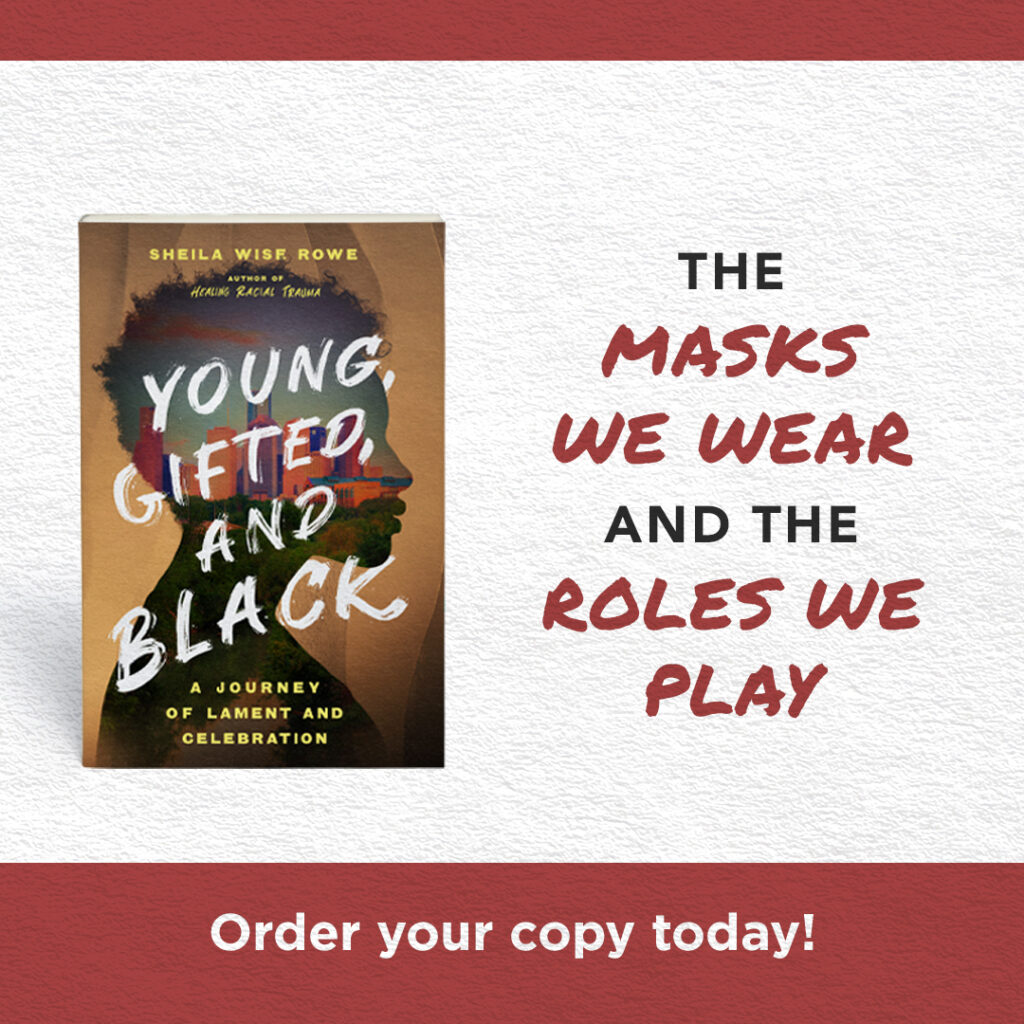Disclosure: This post was sponsored by InterVarsity Press.
Sometimes they treat us as other-worldly creatures, and able to withstand great emotional and physical pain. Medical doctors thought we had a higher pain threshold than other humans. Some myths say that we have super strength, yet others accuse us of being lazy. Black women are supposed to keep it movin, suffer in silence, and wear a mask to hide our pain. Our school, church, community, society, and families normalized these messages. While silence was a mode of survival learned from our ancestors. It was unsafe to stop and address our pain when an enslaved partner or child was sold off or lynched. We face misogynoir (the hatred of Black women), aggression policing, negative social media, family trauma, workplace discrimination, and so much more.. Many of us are in pain and long for healing, but we were told that therapy was only for white folks. We found therapists who discounted our experience as Black women when we sought counseling. They minimized the constant triggers that damaged our self-worth, and mental health. One thing that happened during the pandemic is that in-person and online therapy and support groups are more available. We can now find help to examine when and how we learned to wear a mask and offer tools that help us heal.
Masks and Vows
While growing up, our masks may have helped us survive. Later, code-switching helped us endure environments that were a majority of people who didn’t look like us.. Yet we face a world often confused by our very existence. So, many of us keep our emotions in check, feelings submerged, we live behind a mask. Along with the mask came fears and inner vows. Inner vows are promises to try to defend ourselves against any potential threat or pain, But they also lock everyone else out of this area, so we rely only on ourselves. The mask may seem to be who we really are, but it is an adaptation. It now prevents our needs from being met and discourages attending to our mental health. There are several masks that we Black women may wear:
- Model: We are to be strong, but sometimes we are not strong and do not feel capable. We may wear a mask to keep up the front because we are role models for everyone to emulate. As such, we communicate to the world that we, our family, church, school, or country is praiseworthy. Yet, deep down, we fear, “If I’m not the best, it doesn’t count, I don’t count.” So, we vow, “I will not fail at anything I do.” This is quite exhausting leads to high achievement but also perfectionism and workaholism.
- Peacemaker: Some of us are peacemakers or people-pleasers, but sometimes it’s from anxiety. We navigate through life vowing, “I will not take up space; I will be invisible or I must keep the peace.”
- Comic: Some of us keep everything light to prevent pain from surfacing. We fear we’ll only get love and attention if everyone’s laughing. So, we vow, “Deny the trauma, laugh it off.” We wear a happy mask, and few people see our pain.
- Problem: For those labeled as “a problem” we wear a mask that says to the world that we’re the problem, not our family, church, community, or society. We may even act out because any attention is better than none.
- Wise One: We are wise beyond our years. We were the confidante or emotional caretaker, expected to parent our siblings or be head of the household in our parent’s physical or emotional absence. We fear; “I am only valuable if I am taking care of others.” So, we subconsciously vow, “I can never be first. I have to take care of everyone and everything.”
Our fundamental needs for connection, security, significance, and love do not go away for those who continue to wear a mask. They only go underground. When we cannot tell our truth, our bodies may tell the truth for us, and we may become ill from hiding. Although some of us may struggle to believe that healing and real change are possible, now is the time to start the healing journey.
The Healing Journey
The healing journey is intensely emotional and should not be rushed or ignored. It does not occur orderly, and no two women will heal the same way. But therapy can help us get at what is below the surface. An African proverb stresses the importance of good relationships; “If you want to go quickly, go alone. If you want to go far, go together.” When we lay down a mask and relinquish a role, it can feel like a betrayal of our identity as members of our family or community. We can lay down the mask in therapy and tell our whole story. It may be challenging, but it can be healing to sit with a therapist as uncomfortable and unfamiliar feelings surface. I’ve seen how therapeutic and supportive relationships and good soul/self-care help us heal. As we lean on our faith and trusted others listen to our whole story, we can feel seen and known. As we witness each other’s stories, we find encouragement to take small steps to address our mental health and uncover and rewrite our stories.
I found healing through individual faith-based counseling and in a small therapeutic group. I remember a group member shared how she blamed herself for her parent’s divorce. Growing up, she was the peacemaker, “keep the peace, just do what you are told and don’t question or understand why.” This young woman blamed herself for failures in her relationships and the racism and bias at work. I saw similarities to my own story and one of the masks I wore. At the end of the group session, after our group leader prayed, a memory surfaced of my older sister and me. We were in our best dresses and sitting on the front steps of our house. It felt like we waited hours for dad to pick us up for a visit. He never showed up. This memory revealed how I needed deeper healing from years of believing I had to be perfect. I metaphorically had remained seated on the step, on my best behavior, waiting for dad to show. Individual counseling helped me to work through the pain of this. In therapy I laid down my mask and vows. I accepted that I was imperfect like my dad. I was able to forgive him for the pain he caused and eventually honor him for the good he did. I was able to give myself self-compassion, and appreciate my life and relationships. I emotionally got off the steps. My story was being rewritten.
Rewrite Your Story
Chinua Achebe wrote, “If you don’t like someone’s story, write your own.” Healing involves uncovering and replacing the words and wounds written on our hearts, minds, and bodies by someone else. Here are some small steps you can take now to start rewriting your story: :
- Giving yourself permission to feel. Get quiet and scan your body head to toe is their pain or tension what feeling is present. Feelings are not facts they are messengers alerting you to pay attention to something. What are your feelings saying?
- Engaging in self-compassion: Lovingly encourage and care for yourself like you would a dear friend. You are loved and loveable.
- Allowing trusted others to love and care for you, although it may be initially hard to do. Look for the helpers and make a list including trustworthy friends, family members, therapist, your pastor, and others with whom you can be honest and receive help to rewrite your story.
- Giving yourself permission to stop, rest and heal. You matter, are acceptable, accepted, and enough even when you are not doing something great.
- Using journaling and faith practices such as listening prayer to help you to see who you really are. You are not a problem.
- Slowly emerging from hiding; speak up, write, tell your story, and be seen.
- Realize that you’re not responsible for caring for everyone and everything. You deserve care also. Start by incorporating one positive thing each week to care for yourself and your body.
Research studies confirm how positive physical, emotional, spiritual, and relational experiences such as these can reverse the effects of pain and trauma. We then begin to have well-rounded lives where we are more fully known. We take small steps to embrace hope, love, joy, faith, and remember to play. With each small step, we rewrite our story.
Adapted from Young, Gifted, and Black by Sheila Wise Rowe. Copyright (c) 2022 by Sheila Wise Rowe. Published by InterVarsity Press, Downers Grove, IL. www.ivpress.com

Sheila Wise Rowe, the author of Healing Racial Trauma and the forthcoming title Young, Gifted, and Black, holds a master’s degree in counseling psychology. For over twenty-five years, she ministered to abuse and trauma survivors in the United States, France, and for a decade in Johannesburg, South Africa. Sheila taught counseling and trauma-related courses. She lives with her family in the Boston area and is a sought-after writer, speaker, and spiritual director.



